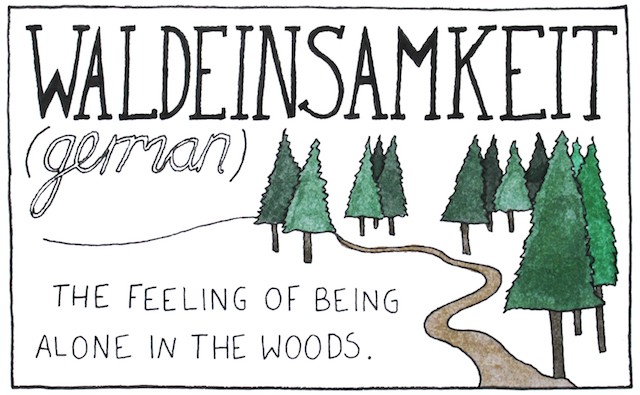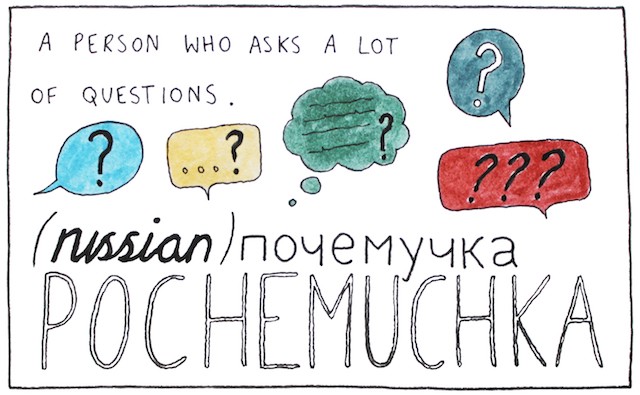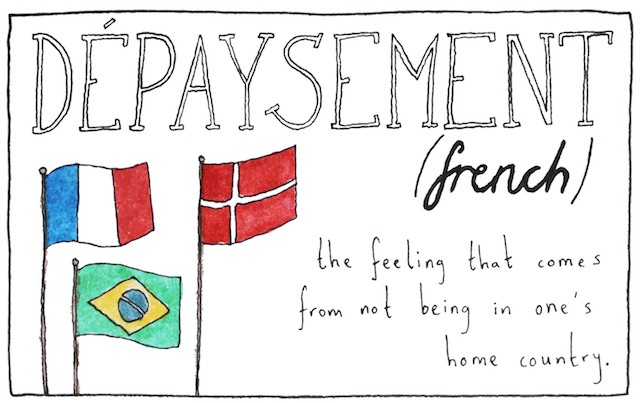Word Search
by Sabine Heinlein

When I moved to New York from Germany, I didn’t have words. I had written for prominent papers in Hamburg, but in New York my German faded quickly and English was slow to take its place. After a few months here I found myself close to aphasic. All I had now was a hasty, unhappy marriage and an apartment in Bushwick that was cheap and hot. Through the window bars I could see glimpses of a trash-filled backyard and an alley cat with kittens. During the day I could hear the termites in the backyard destroying the wooden benches that were built by the old German winemaker who owned the building at the turn of the century. I could see the neighbors in their cemented yard dancing to reggaeton. Voiceless, I listened to unfamiliar sounds. Everything around me was falling apart: my marriage, the benches, my brain, my language. I decided to take in the cat and her kittens.
As my first, desolate New York summer was thrust away by fall, the outdoor music subsided. The sound of the termites was replaced by that of the mice making their winter nests in my walls.
“Neighborhood was bad when Germans lived here,” my old Puerto Rican neighbor Mira told me one day when I was finally able to ask her whether she, too, could hear the mice in the walls and the termites in the benches. Our short conversations were guessing games. Our English was rudimentary.
I used arrogant expressions like sustainable living, but Mira outdid me in colloquialisms and American pop culture. She knew what There is more than one way to skin a cat meant, for example. At least that’s what she said when we discussed mice extermination. Mira also conspiratorially called me “Sabrina, the teenage witch.” I didn’t get the reference, and I felt insulted.
Had Bushwick really been worse when “the Germans” still made up its majority? At the end of the 19th century, I’d read, the neighborhood was known as “the beer capital of the Northeast”; in 1890 there were 14 beer breweries operating within a 14-block radius. How could it have been worse? I glanced at the gnawed-off chicken wings in my yard. (“To feed the poor cats,” Mira said apologetically when I addressed the garbage flying past my windows. She offered no explanation for the old batteries that littered my yard, possibly one of her ways to skin a cat.)
The mouse problem got worse. Trying to buy mouse traps and being handed mustard in return was beginning to take its toll. The cat, although now employing her kittens, wasn’t able to catch up. She became fixated on my compost pile, which I had started partly to teach Mira a lesson about sustainable living. Later I found out that my compost had attracted rats, which explained the cat’s fascination.
I sat on my noisy backyard benches with my back to the compost and the rats, sipping a glass of wine and fantasizing about the good old times when Bushwick was still primarily German, when people were clean, square and predictable. They understood each other. They carried their walking sticks up their asses. I was embarrassed by my nationalistic sentiments, but in times of chaos, want and uncertainty, humans — particularly German humans — gravitate toward order and safety.
It was then that I received a phone call from my friend Franzi, another recent German immigrant.
Franzi wanted to know if I was interested in searching for words. The German artist Karin Sander had hired her to collect one word from each language spoken in New York City for a conceptual art project titled wordsearch. To add dimension (and because conceptual art works in mysterious and inflated ways), each word was to be translated into the other 250 languages we would find. A grid of 250 x 250 words, wordsearch was to be published as a giant word sculpture in the stock listings of the New York Times. Since there are more than 250 languages spoken in New York, Franzi needed an assistant.
I was happy to accept the challenge to gather words from real New Yorkers, or “word donors” as we called them. I’d spent all of my time in New York searching for words, so the idea of getting paid $25 an hour for it seemed like a small miracle.

The first weeks of wordsearch were easy: For a Polish word we would go to Greenpoint; for Mandarin and Cantonese, Chinatown and Flushing. But soon things slowed down. Where could we find some of Cameroon’s more than 200 tribal languages? And who in New York speaks Bikol, Cebuano, Hiligaynon, Pangasinense and Waray, some of the many unofficial languages of the Philippines? Franzi and I ventured on to the Missions to the United Nations.
One morning we stepped into Burkina Faso, where several women sat in small compartments with piles of files towering over them. The symphony of ringing phones was accompanied by the periodic opening and closing of drawers and doors, the ubiquitous sounds of business that didn’t need translating.
Marvin, the Filipino driver of the Ambassador of Burkina Faso, immediately flooded us with questions. We told him about our mission, adding that we were originally from Germany, to which he wistfully responded, “Germany, ahhh, Germany… Do you know Hitler?”
“Not personally,” I said.
Marvin chuckled. “Did you know that Hitler had a German shepherd?”
“Yes,” Franzi said. “Blondie!” (Wasn’t it Schatzi? I wondered.)
“Did you know that in the Philippines, we eat dogs?”
“Even German shepherds?” I asked.
“We eat all kinds of dogs, because dogs are good for asthma.” Marvin listed the Philippine languages: “There is Tagalog, Visayan, Ilocano, Bikol, Pampamgan, Pangasinan, Igorot, Maranao… and English,” he said. “We speak English, too.”
Before he donated, Marvin helped us collect words from his African colleagues. Nagouni in Mòoré, faso in Dioula, and spala in Pulaar. In English, respectively: nut, house of father and hail. The words were beautiful. They spilled across the room like tumbleweeds, and while I could hardly catch hold of them, their poetic sounds made me hopeful. Words turned back into play, and my dark mood lifted. Some day we would understand each other.

In New York, I tried to remind myself that acquiring foreign words as an adult had its perks. Unlike my German words, most of which I had learned subconsciously, my English words came embedded in stories. Hail? Hail hadn’t been a word high up on my agenda. It hadn’t hailed since I arrived in New York. Until I met Marvin I didn’t even know what hail meant. Now, whenever I hear the word I think about Marvin, the African women’s wildly patterned dresses and the small, cramped cubicles at the Mission of Burkina Faso.
Of course, not all words and expressions come embedded in fun stories. Much of my English language experience was laced with humiliation. I remember asking a woman I considered a potential friend whether she wanted to have coffee with me. “Not now,” the woman responded, “but I’ll catch you later.” This was the first time I’d heard the expression, and I was appalled by its furtiveness and lack of commitment. On the surface it seemed to imply, “You are so fast, popular and successful that if I want to have coffee with you, I’ll have to run and catch you.” It was supposed to give the runner, whose invitation has been turned down, a sense of dignity. But when the woman said, “I’ll catch you later,” I knew that she’d rather hide from me than try.
Marvin donated the word buri in Pampamgan. Buri means to want in English and Marvin wanted a lot of things, preferably all of them at once. He now really wanted, he said, to introduce us to the Ambassador’s chef Issouf.
Issouf was wearing a dark blue coat and a fur cap; his cheeks were engraved with large, symmetrical scars. He greeted us shyly in Bissa, one of 69 languages spoken in Burkina Faso.
“Please,” Marvin begged him, “Tell the girls where the scars on your face are from.” I was partly embarrassed and partly grateful that the topic had come up. Issouf explained that the marks on his cheeks were a form of identification. A custom that hasn’t been practiced for decades, the scar pattern had been carved shortly after birth. Because of the many different languages in Burkina Faso and the low literacy rate of 20%, people in different villages and cities could trust scars over language: if a child got lost, the finder could identify his village by the pattern on his cheeks.
Issouf wrote down scars in Bissa: passe. We asked our new word donor whether we could take a picture of him, and Marvin ordered Issouf to stand in front of the hand-painted leather map of Burkina Faso. Embellishing the scene with a choreographer’s touch, Marvin told him to point to his hometown. Obligingly, Issouf pointed to an empty spot on the map. I got a moist eye behind the camera’s viewfinder.
To gain one thing always means to lose another. The longer I had spent in my new country, the blurrier my homeland became, and I had to make a decision. I would speak — and eventually write — in the language that surrounded me on a daily basis. What counted most to me were spoken words and the present, the chatter I heard on the subway and in the streets, the dialogue on the radio and on TV. German now sounded lifeless. English it was.
At the Swaziland Mission, we were informed that the First Counselor would ask the Ambassador for permission to contribute a word in Swazi. The Ambassador would then contact the Minister of Swaziland, who, in turn, would ask the King of Swaziland to donate a word. If the King approved of our inquiry, we could come back to pick up our word.
The intricacy of the process was like the way the adult brain handles foreign languages, painstakingly compartmentalizing and learning how to speak. The paths between the tongue and the parts of the brain responsible for second-language acquisition are complex. Neurolinguists concerned with language learning focus on two main areas in the brain: first Wernicke’s area, associated with understanding and named after the 19th-century German neuropathologist Carl Wernicke, and second Broca’s area, which is linked to Wernicke’s area via a thick bundle of nerves. Broca’s area is responsible for spoken language, and studies have shown that adults who learn a second language have separate little compartments inside Broca’s area for each language they learn. (Children who learn several languages at once do not compartmentalize; it’s all one big happy multilingual party in their Broca’s area.)
In contrast, Wernicke’s area isn’t compartmentalized; the hearing and understanding of different languages happens in one common area. The tiny messengers in Wernicke’s hearing area painstakingly locate and then hand over information to the tiny messengers in the different speaking departments of Broca’s area. This explains why it’s easier to understand a second language than to speak it. One can only imagine the work all these little language messengers have to accomplish before the words finally arrive at the tip of one’s tongue.
Sometimes — particularly when I’m drunk, exhausted, sad, insecure, angry (or all at once) — I can feel the messengers crossing their tiny arms petulantly. I know that occasionally they pass information on to the wrong department. Words and meaning get lost on the way.
By the end of our day at the U.N., I was exhausted, having traveled through three continents and five countries through words. But as I made my way back to Bushwick I felt strangely optimistic, at home in New York for the very first time. In my apartment I sat on my couch and watched my cat and her kittens, and listened to the mice scratch. I felt that I had found order — not the kind that one would find assembled in a conceptual word spread in the New York Times, but one that was real and heartfelt. That night, I started to stitch together my first American story.
Previously: Running Blind
Art by Ella Frances Sanders. Her book, based on the original illustrations, comes out this September from Ten Speed Press.
A Pushcart Prize winner, Sabine Heinlein is the author of the narrative nonfiction book Among Murderers: Life After Prison (University of California Press, 2013).